Evaluating the Role of International Humanitarian Law in Protecting Women and Girls from Sexual Violence in the Boko Haram Conflict in Northeast Nigeria
Main Article Content
Abstract
The Boko Haram conflict in Northeast Nigeria has caused widespread devastation, with women and girls disproportionately affected by sexual violence. This violence—including abductions, forced marriages, and sexual enslavement—has been well-documented as part of Boko Haram’s strategy to destabilize communities and instil fear according to Amnesty International, 2015. International Humanitarian Law establishes protections for civilians and vulnerable groups during armed conflicts. However, its enforcement in the Boko Haram insurgency, remains limited. Traditional international law frameworks have often been critiqued for their failure to fully account for the lived experiences of marginalized groups, particularly women, in conflict. A feminist approach challenges these traditional priorities by highlighting how gendered harms—are often inadequately addressed in legal discourse. I adopt a critical feminist methodology to critique the gendered dimensions of violence in the Boko Haram conflict and the limitations of IHL in addressing these harms. The feminist perspective argue that traditional legal frameworks often reinforce patriarchal structures, whereas feminist approaches seek to ensure that legal protections reflect the realities of women’s experiences in conflict. Furthermore, while feminist approaches to human rights advocate for more inclusive framework, they may also face challenges when engaging with deeply rooted cultural norms that resist interventions. I structure the paper in three key sections. The first section provides an overview of the Boko Haram insurgency and the forms of gender-based violence used as a weapon of war. The second section critically examines provisions of IHL and traditional human rights framework and evaluates their effectiveness in protecting women and girls in conflict zones through a feminist lens, it highlights the limitations of IHL and human rights in cultural contexts. The last section proposes solutions based on successful strategies implemented in similar conflict-affected regions. This paper will contribute to feminist approaches to international law to provide a more nuanced understanding of gendered harms in conflict and show that addressing sexual violence in conflict requires a gender-sensitive localized approach while navigating the cultural and legal complexities of conflict zones like Northeast Nigeria.
Article Details

This work is licensed under a Creative Commons Attribution 4.0 International License.
Authors who publish with this journal agree to the following terms:
- Authors retain copyright and grant the journal right of first publication with the work simultaneously licensed under a Creative Commons Attribution License that allows others to share the work with an acknowledgement of the work's authorship and initial publication in this journal.
- Authors are able to enter into separate, additional contractual arrangements for the non-exclusive distribution of the journal's published version of the work (e.g., post it to an institutional repository or publish it in a book), with an acknowledgement of its initial publication in this journal.
- Authors are permitted and encouraged to post their work online (e.g., in institutional repositories or on their website) prior to and during the submission process, as it can lead to productive exchanges, as well as earlier and greater citation of published work (See The Effect of Open Access).

